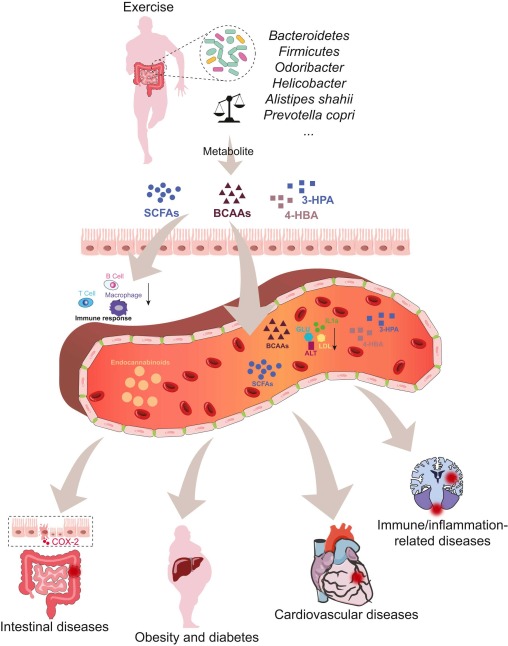Exercise-Induced Changes in Gut Microbiota
Exercise has been shown to induce significant alterations in the composition and functionality of the gut microbiota. These changes can enhance an individual’s exercise capacity and metabolic pathways, ultimately impacting overall health. Some key findings include:
- Increase in Veillonella atypica: Post-exercise fecal samples from marathon runners revealed an increase in Veillonella atypica. Inoculating mice with this genus significantly enhanced their exercise capacity by metabolizing lactate into propionate.
- Variations in Methanobrevibacter smithii: Professional cyclists displayed variations in the abundance of Methanobrevibacter smithii, linked to methane, energy, and carbohydrate metabolism, compared to amateur cyclists.
- Alterations in short-chain fatty acids (SCFAs): Exercise-induced changes in the microbiota were associated with increased metabolism of short-chain fatty acids, such as propionate, acetate, and butyrate. These SCFAs play crucial roles in metabolic pathways and health maintenance.
- Microbial metabolite production: Analysis of public databases revealed increased production of beneficial molecules like vitamin B12 in athletes’ gut microbiomes, indicating a symbiotic relationship between the host and its microbiota.
- Gut-brain axis modulation: Recent discoveries suggest a gut-brain metabolic axis pathway, where gut microbes enhance exercise motivation by prompting the brain to produce more dopamine.
Disease-Related Microbiome Alterations
Imbalances in the gut microbiota have been associated with various diseases, including obesity, diabetes, cardiovascular diseases, and neurological disorders. Key findings include:
- Obesity and diabetes: Obese individuals exhibited a less diverse gut microbiome, with decreased abundance of beneficial families like Lachnospiraceae and Ruminococcaceae. Similarly, specific microbiome genera were found to correlate positively or negatively with type 2 diabetes.
- Cardiovascular diseases: Studies have highlighted the role of the ‘gut-heart axis’ in cardiovascular health. Certain gut microbiota alterations were associated with atherosclerosis, myocardial infarction, and heart failure, suggesting potential therapeutic targets.
- Neurological disorders: Dysregulation in the gut microbiome ecosystem has been linked to Alzheimer’s and Parkinson’s diseases. Specific alterations in microbial taxa were observed in patients with these neurological disorders, indicating a potential avenue for therapeutic interventions.
- Cancers: Imbalances in the gut microbiome have been implicated in colorectal cancer development and chemotherapy resistance. Specific bacterial taxa, such as Fusobacterium, were found to be enriched in colorectal cancer tissues.
3. Therapeutic Implications of Exercise-Induced Microbiome Alterations
Exercise-induced changes in the gut microbiota offer potential therapeutic avenues for various diseases. Key findings include:
- Intestinal diseases: Exercise interventions in obese mice improved gut microbiome composition, reduced inflammation, and enhanced intestinal barrier function. Fecal microbiota transplantation (FMT) from exercised mice alleviated obesity symptoms in obese mice.
- Obesity and diabetes: FMT from exercised mice to obese mice mitigated obesity symptoms and improved glucose homeostasis and insulin sensitivity. Exercise-induced changes in the gut microbiome were associated with improvements in diabetes outcomes.
- Cardiovascular diseases: Exercise training provided cardiac protection and enhanced gut microbial richness in mice post-myocardial infarction. FMT from exercised mice improved heart function in recipient mice.
- Immune/inflammation-related diseases: Strength exercise increased gut microbial diversity and reduced inflammation in autoimmune encephalomyelitis mice. Exercise also reduced joint pain and inflammation levels, partly through modulation of the gut microbiome.
Further research is needed to elucidate the mechanisms underlying the interaction between exercise, gut microbiota, and disease outcomes. Innovative methods and advanced omics technologies will continue to advance our understanding of these complex relationships, paving the way for novel therapeutic interventions. Additionally, investigating the impact of factors like diet, medication, and stress on the gut microbiome will provide valuable insights into personalized disease management strategies.
Overall, exercise-induced alterations in the gut microbiome hold significant promise for improving health outcomes and treating various diseases, offering a holistic approach to disease prevention and management.
Link to the article : https://tinyurl.com/52d387fe
